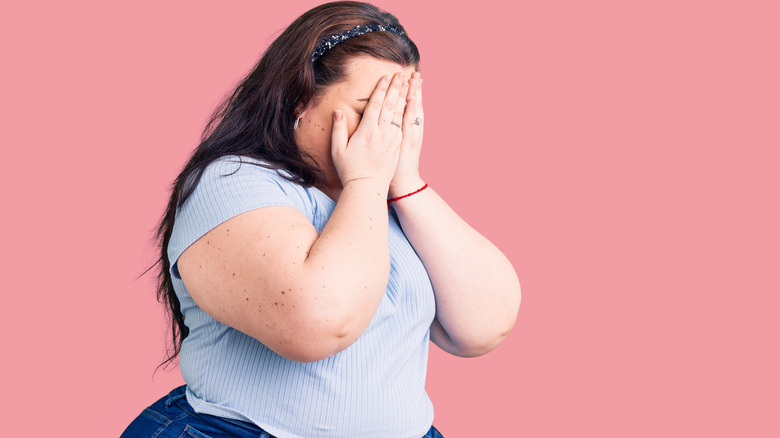If You're Being Fat Shamed By Strangers, Here's What You Should Do
It happens all too often: You're enjoying an ice-cream cone at the park when a passerby mutters, "Ever hear of a salad?" You post a TikTok dance video, and trolls post nasty "pig" and "whale" comments. The salesperson in the clothing department kindly suggests that maybe a looser top would be more flattering. Fat-shaming takes a number of forms — from the well-intentioned to the downright abusive — but it all has the same result: shame, guilt, and self-doubt.
Even in this so-called woke age, weight bias is still alive and well. Studies show that overweight individuals are perceived as less attractive, less intelligent, and less successful than the rest of the population, according to the National Institutes of Health. There's also a tendency to assume that fat persons have poor diet and exercise habits, and merely lack the willpower to improve their lifestyles. Sadly, some feel compelled to comment on others' weight, either with backhanded compliments or with outright bullying.
Not even celebrities are immune. Most recently, Lizzo — whose music celebrates body positivity — spoke out tearfully about the comments she's gotten on social media about her weight. "It's like it doesn't matter how much positive energy you put into the world, you're still going to have people who have something, something mean to say about you," she said (via Newsweek).
You don't have to put up with the haters
Apart from being intrusive or just plain cruel, fat-shaming has the exact opposite of its intended effect. According to studies reported at a meeting of the 2019 Canadian Obesity Summit, being exposed to fat bias can actually result in weight gain. The stress induced by these comments causes a sharp rise in the hormone cortisol, which in turn reduces one's ability to control eating habits. People who internalize these negative thoughts have a greater risk of depression, low self-esteem, and eating disorders, and they're also more likely to develop metabolic syndrome, which is linked to greater weight gain.
So what can you do if some stranger tries to hate on your weight? You could take a cue from the celebs who have to deal with the trolls on the regular and have some responses handy. Try: "My body is none of your business" or "Why would you ever say something so nasty?" Tyra Banks put it more succinctly: "Kiss my fat a**" (via SugarCandy).
You can opt to not acknowledge the comments at all, suggests Bustle, or remove yourself from the situation if you can. Or, if you sense the shamer has your best interests at heart, you could take a more understanding approach: "I appreciate your concern, but I love my body the way it is."
Speaking of loving your body, make sure you do, advises the Kentucky Counseling Center. Instead of obsessing about pounds and inches, remind yourself of all the amazing things your body can do. When you're comfortable in your own skin, it's harder for other people to get under it.
If you are struggling with an eating disorder, or know someone who is, help is available. Visit the National Eating Disorders Association website or contact NEDA's Live Helpline at 1-800-931-2237. You can also receive 24/7 Crisis Support via text (send NEDA to 741-741).

